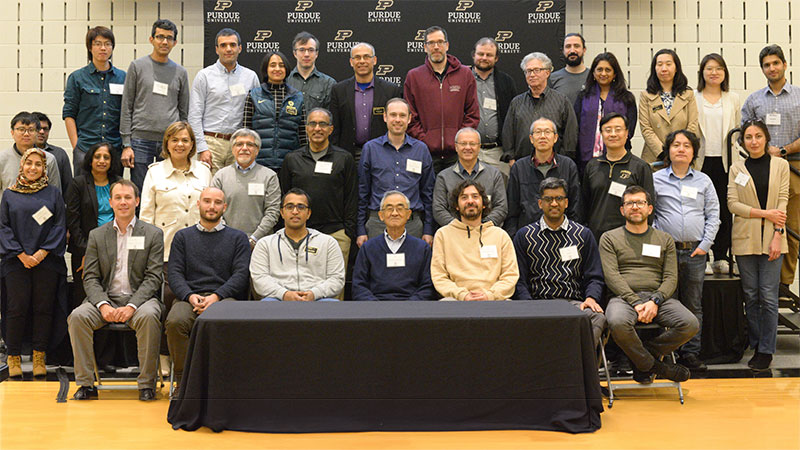CRISP autonomous-systems resilience workshop spotlights opportunities, challenges

Rewards and risks of autonomous systems used in military, civilian and cyber-physical systems were outlined and addressed at a recent workshop involving Purdue University researchers and leaders from federal government and corporate entities.
Autonomous systems include military drones, driverless cars and autonomous mobile robots used in warehouses, among many others.
“Today, the need for resilience is front and center for autonomous systems,” said Saurabh Bagchi, workshop chair and director of Purdue’s Center for Resilient Infrastructures, Systems and Processes (CRISP). “A failure, even transient, whether due to natural causes or security attacks, quickly propagates through autonomous systems, such as in autonomous transportation or in manufacturing, jeopardizing a mission or putting human safety at risk.”
Bagchi, professor of electrical and computer engineering, was speaking to the central theme of the National Science Foundation-supported Grand Challenges in Resilience Workshop, held Nov. 13-15 on the West Lafayette campus. The workshop was co-sponsored by CRISP and the Institute for Physical AI, a key interdisciplinary research institute that contributes to one of what are now four key pillars in the Purdue Computes initiative.
Senior leaders from the NSF, Department of Defense and U.S. Army Corps of Engineers, as well as representatives from Google, Qualcomm, Intel and NVIDIA participated in the workshop. Their discussion focused on resilience efforts and concerns in their diverse fields and best practices for transferring academic research to industry.
After participants took part in brainstorming sessions (video for which are available on the event page), oral reports were drafted on the following topics:
- Post-Moore and emerging computing platforms
- Next big research challenges in resilient cyber systems
- Applications that demand new security and reliability techniques
- CPS challenges for autonomous systems and smart communities
“Resilience of cyber-physical systems is a critical area of research and spans many of our important systems and infrastructures,” said David Corman, director of the NSF Cyber-Physical Systems program. “The talks and panels brought out important challenges and future research needs. I eagerly anticipate the workshop report and forthcoming vision papers that will lead to research strengthening our system’s resilience.”
Enrique Matheu, executive director of research and development at the U.S. Army Corps of Engineers , said: “This workshop was a great occasion to exchange information, learn from each other, and discuss innovative ways to enhance the resilience of complex cyber-physical systems underpinning our nation’s critical infrastructure. I enjoyed the cross-pollination of ideas from academics and industry practitioners from several different domains.”
Three panels, which will lead to vision papers, were held on topical technology matters. A call to participate in authoring these vision papers is available here, and the papers will be available through the event website when ready for publication. Paper topics are:
- “Resilience in CPS: Principles to Learn and Mountains to Climb”
- “AI: Role for the Virtual and the Physical to Play Together”
- “Academic Research to Industry Translation: What to Learn and What to Unlearn”
The workshop featured two keynotes on different aspects of resilience, videos of which are available on the event page. The first, from Ramesh Govindan, Northrop-Grumman Chair in Engineering and professor of computer science and electrical engineering at the University of Southern California, focused on the resilience challenges and the promising solutions for “hyperscalers” or large cloud service providers. These providers offer computing and storage at enterprise scale. While there is no universal standard for what should be classified as a hyperscaler, major cloud providers such as Amazon Web Services, Google Cloud, Microsoft Azure, IBM Cloud and Alibaba Cloud fit the description.
The second keynote was by Christian Maciocco, senior principal engineer and senior director of Telecom Systems Research in Intel Labs. He discussed Aether, a stable, open-source 5G platform as well as the possibility of provisioning AI/ML-enabled edge services.
The workshop is part of a national effort led by the NSF and Army Corps of Engineers to document scenarios in which systems have been found to be resilient or vulnerable and to draw principles for future design accordingly. More strategic workshops will be conducted across the country seeking insights from industry, government and academia to develop a roadmap for resilience in autonomous systems and CPS.
Purdue academic leaders including Bernard Engel, the Glenn W. Sample Dean of Agriculture; Arvind Raman, the John A. Edwardson Dean of the College of Engineering; and Karen Plaut, executive vice president for research, engaged with workshop participants.
The workshop was organized at Purdue by CRISP’s leadership team. For more information on the workshop and access to videos, reports and vision statements, please visit the event page or contact sbagchi@purdue.edu.